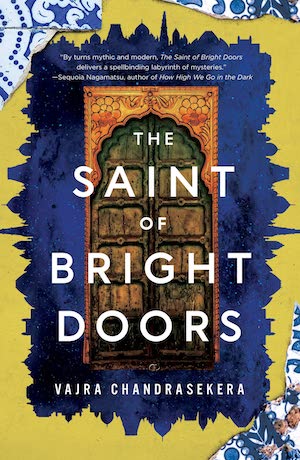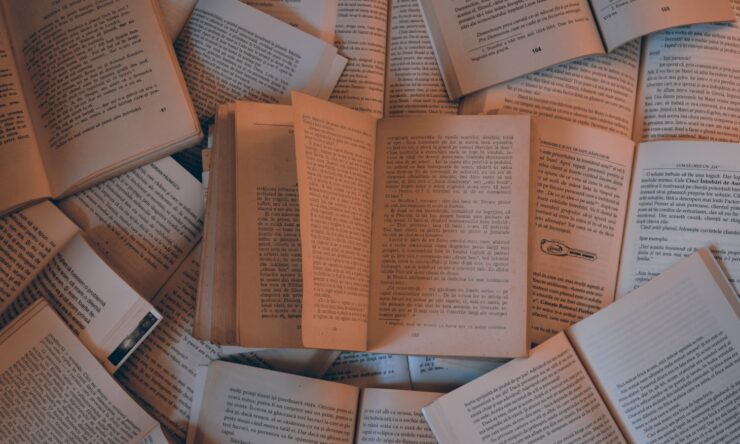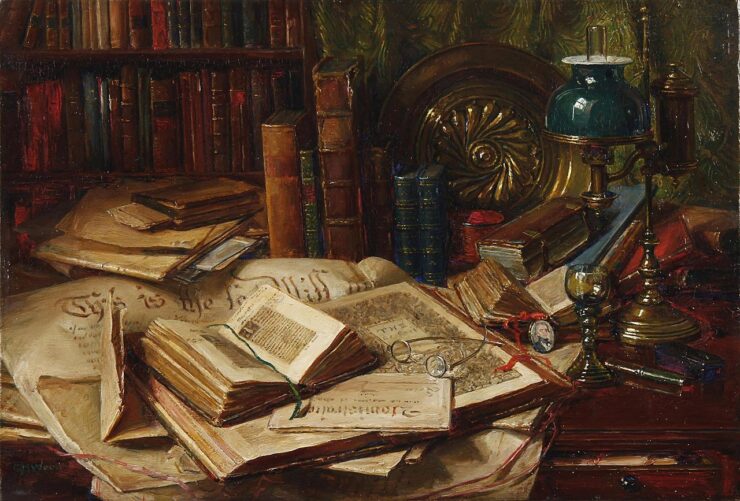A few months back, The New York Times asked Leigh Bardugo what books got her into fantasy as a genre. She named a handful of books, adding,”I think any time you can remember where you were when you read a book for the first time (Dune—tiny motel room on a miserable family trip, A Swiftly Tilting Planet on the white shag carpet in my grandparents’ back room) that means something.”
And it does, doesn’t it? Over the months I’ve been writing this column, I’ve mentioned more than one book about which I remember the specifics of my first reading experience: trying not to audibly cry on a Greyhound bus as I finished Where the Red Fern Grows; reading Lavinia on a train, the sound of wheels on tracks locking in with Le Guin’s prose; wading through Wanderers on a (pre-pandemic) plane, increasingly creeped out by the people too close to me.
Would I remember these books the same way if I had read them elsewhere? What alchemy makes these memories so clear? What is it that makes some stories coalesce so clearly in our minds, like postcards you can flip back through?
I don’t think there’s any science to this—no equation a person can math out. Like a nickname, you can’t force it. There are things that will help me remember where I read something; I remember many of the books I read in the backyard of my beloved, now-closed favorite Brooklyn bar in part simply because I liked to post pictures of them on Instagram, the bright orange tables making a vivid contrast with just about any cover. But I made that happen. It’s a different kind of remembering—intentional, not the kind that sneaks up on you and stays.
If a book can find you at the right time, it can find you at the right place, too. I used to think it was bad luck that I read The Wind-Up Bird Chronicle in a million tiny sections while traveling and living in a hostel, but now I think that the very unsettledness, the way I only remember scenes, not the whole book—it fits together with the book itself. I don’t remember anything I read on so many other trips—there were books in my bag, surely. There always are. But the titles escape me.
When you scan your bookshelves, what do you remember? The way Microserfs sunk into our language in college. The moment when I suddenly understood Bascule’s accent in Feersum Endjinn. Sometimes it’s words, sometimes it’s places. I spent the first anniversary of 9/11 sprawled on a blanket in the sun on my mother’s deck, reading A Heartbreaking Work of Staggering Genius and very determinedly staying the hell off the internet. I don’t remember anything about the book, but I remember the sun, and the feeling like if I moved, I would have to start holding my breath.
The “how” of reading can mean a lot of things, from format to location to speed to mood. Under the covers with a flashlight? While being shuttled between parents’ houses? On the train, in the bath, before bed? Books ask to be read differently, feel different when we read them differently, resonate at different tones when read aloud or to ourselves. Heraclitus said that you never step in the same river twice. You probably never read the same book twice, either.
In a dream world, maybe every reading experience would be memorable for its own reasons—we would be reading in the sun, reading under the trees, reading in beautiful, relaxing spaces that let us focus so deeply on the stories that everything else falls away. Reality is less picturesque: reading on a commute, over breakfast, in a lunch hour that feels stolen even though you’ve earned it. Reading outside the restaurant when you’re the first person to arrive and you don’t want to go in alone. Reading at the bar while you try to ignore the loud people behind you.
Though all of these things are perfect, in their own way, sometimes.
There is another kind of reading experience I’ve been thinking about, lately, and it’s this: the unfollowable books. Every so often, I read something for which it feels like there is no cure. There is nothing else that lives in the same headspace the book creates. No other book sings the same clear, pure note. You may find something that works in harmony, or you may just throw up your hands and let your next selection clash with the things the unfollowable book has done to your head.
Buy the Book


The Saint of Bright Doors
Has this happened to you? When I read Piranesi I felt like the massive rooms and spaces of Susanna Clarke’s novel were forming in the synapses of my brain. Afterward, nothing fit there right; everything rattled and shook loose, and I wandered around in a daze, picking books up and putting them down. I have never been able to explain quite why I sobbed at the end of Jordy Rosenberg’s Confessions of the Fox, but there was a kind of hope in those last pages that made me feel shaken and reset in some invisible yet fundamental way. I am still nervous about rereading Nalo Hopkinson’s Midnight Robber because it, too, did something in my brain, some transformational magic, that I am desperate to find once more and also afraid I will never see again.
Profound, ineffable, unmatched: the experience of hearing A Wizard of Earthsea for the first time; of trying to read Catherynne Valente’s Palimpsest only while in motion; of trying to envision the worlds of Rin Chupeco’s The Bone Witch or Lynne Berstrand’s City of the Uncommon Thief. It can happen with nonfiction, too: The way I slowed my reading down, trying to go methodically, unhurriedly through Claire Dederer’s Monsters, or Elissa Washuta’s White Magic.
You can’t force a book to be the one that changes your worldview, your ideas about story, your sense of scale or scope; you can look for these things, of course, seek them out as best we can, though it can be hard to find out what a book is really, really about until you’re deep in it. You can try to match books with moments, looking for those picture-perfect times when the book and the place lock in, a photo in your mind that you never lose or forget. But so much of this—of the memorable and perfect and infuriating moments found in pages—is just the simple magic of being a reader. It’s obvious, and yet: it’s hard to just let things happen, sometimes. Stay curious, stay sharp, stay ready. The next book you read might be one you never forget.
Molly Templeton lives and writes in Oregon, and spends as much time as possible in the woods. Sometimes she talks about books on Twitter.














